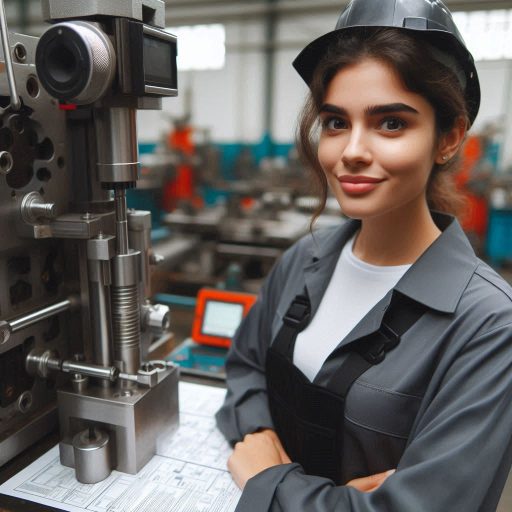Introduction
Overview of the Importance of Industrial Machinery Mechanics
Industrial machinery mechanics are vital for maintaining the efficiency of machinery in various sectors.
Their expertise ensures that machines operate smoothly and safely.
These professionals play a crucial role in manufacturing, agriculture, and other industries, where machinery is the backbone of operations.
They troubleshoot issues, perform repairs, and conduct routine maintenance, preventing costly downtime.
Their skills keep production lines running and equipment functioning optimally.
How Industrial Machinery Mechanics Play a Crucial Role in Various Industries
The importance of these mechanics cannot be overstated; their work directly impacts productivity and safety.
They ensure that machinery functions correctly, which is essential for uninterrupted production and operational success.
Transition into the Real Stories of Successful Industrial Machinery Mechanics
Transitioning to real stories, we see how successful industrial machinery mechanics have made significant contributions to their fields.
These stories highlight their expertise, problem-solving abilities, and dedication.
They serve as inspiration for those pursuing a career in this essential industry.
Each story provides insight into the diverse paths to success and the profound impact these professionals have on their organizations.
Story of John, a seasoned industrial machinery mechanic
Background Information on John’s Experience in the Industry
John has spent over 15 years in the industrial machinery mechanics industry.
He started as an apprentice right after high school.
His passion for mechanics led him to pursue a career in maintaining and repairing industrial equipment.
Over the years, John worked with various types of machinery, gaining extensive hands-on experience.
He specialized in hydraulic systems and complex conveyor belt mechanisms.
John‘s technical skills quickly advanced, making him a trusted expert in his field.
His commitment to continuous learning allowed him to stay updated with the latest technologies.
Throughout his career, John built a reputation for his problem-solving abilities and meticulous attention to detail.
His experience spans different industries, including manufacturing, food processing, and automotive.
John‘s journey in the industry showcases the value of dedication and expertise.
Challenges He Faced and How He Overcame Them
John faced numerous challenges throughout his career as an industrial machinery mechanic.
Early on, he encountered difficulties with complex machinery breakdowns.
Some equipment issues were so intricate that they required innovative solutions.
John invested time in learning new diagnostic techniques to tackle these challenges.
He often worked long hours, sometimes in harsh environments, to ensure machinery was up and running.
One of the biggest challenges was staying updated with rapidly evolving technologies.
To overcome this, John participated in advanced training programs and workshops.
He also faced the challenge of working under pressure, especially during critical production downtimes.
John learned to remain calm and focused, using his expertise to resolve issues efficiently.
Communication was another challenge, as he had to explain technical problems to non-technical team members.
John honed his communication skills, ensuring clear and effective collaboration with colleagues.
His resilience and determination helped him navigate these challenges successfully.
Key Achievements and Success Stories in His Career
John’s career is marked by several key achievements and success stories.
One of his proudest moments was leading a team to overhaul a failing conveyor system.
The project was critical for a manufacturing plant that had been experiencing significant production delays.
John‘s innovative approach to the overhaul saved the company substantial time and money.
His solution not only restored the system but also improved its efficiency.
Another notable achievement was when John successfully mentored a group of apprentices.
His guidance helped them develop into skilled mechanics who now lead their teams.
John also played a key role in implementing a preventive maintenance program at a large automotive plant.
This program significantly reduced equipment downtime and improved overall production efficiency.
John‘s dedication and expertise earned him recognition from his employers and peers.
He received several awards for his outstanding contributions to machinery maintenance and repair.
His success stories serve as inspiration for aspiring industrial machinery mechanics.
In the end, John‘s experience in the industrial machinery mechanics industry highlights the importance of perseverance, continuous learning, and adaptability.
Despite facing numerous challenges, he overcame them with determination and skill.
His key achievements, such as leading successful projects and mentoring others, demonstrate his impact on the industry.
John‘s story is a testament to the rewarding career opportunities available in industrial machinery mechanics.
Through hard work and dedication, he built a successful career, becoming a respected expert in his field.
Read: Radiologic Technologist: Work Environment Insights
Profile of Sarah, a female industrial machinery mechanic
Breaking Gender Stereotypes in a Male-Dominated Industry
Breaking gender stereotypes in the industrial machinery field is no small feat.
This industry has long been male-dominated, with few women pursuing careers as machinery mechanics.
However, women like Sarah are challenging these norms and proving that gender does not determine skill or success.
By entering and excelling in this field, Sarah is paving the way for other women to follow.
Her story demonstrates that determination, passion, and hard work can overcome societal barriers.
Sarah‘s success highlights the importance of diversity in traditionally male-dominated industries and inspires others to break through similar barriers.
Sarah’s Journey to Becoming a Successful Machinery Mechanic
Sarah’s journey to becoming a successful machinery mechanic was not without its challenges.
From an early age, she was fascinated by how machines work, but she faced skepticism and doubt from those around her.
Despite this, Sarah pursued her passion, enrolling in a technical school and excelling in her coursework.
She completed a demanding apprenticeship, where she often had to prove herself in a male-dominated environment.
Her persistence paid off as she became known for her exceptional skills and work ethic.
Sarah quickly advanced in her career, taking on more complex projects and earning the respect of her peers.
Impact of Her Work on the Industry and Community
Sarah‘s impact extends beyond her personal achievements; she has made significant contributions to the industry and her community.
Her innovative approach to machinery maintenance and repair has led to increased efficiency and reduced downtime for her employers.
Sarah’s work has not only improved the operations of the companies she has worked for but has also set new standards in the industry.
Additionally, she is an active mentor, encouraging young women to consider careers in industrial mechanics.
Through her mentorship, Sarah is helping to build a more diverse and inclusive workforce, which benefits the entire industry.
Generally, Sarah’s story is a powerful example of breaking gender stereotypes and succeeding in a male-dominated industry.
Her journey from a passionate learner to a respected machinery mechanic demonstrates that perseverance and skill can overcome any obstacle.
The impact of her work is felt not only in the companies she has worked for but also in the broader community, where she inspires the next generation of mechanics.
Sarah‘s success is a testament to the importance of diversity in the workplace and the positive changes that can result when individuals challenge traditional norms.
Her story serves as an inspiration to anyone facing barriers in their chosen career paths.
Read: Future of CAD Technician Jobs in Engineering
Interview with Carlos, a young industrial machinery mechanic
Insights into the Daily Responsibilities of a Machinery Mechanic
Carlos, a seasoned industrial machinery mechanic, spends his days inspecting and maintaining machinery to prevent breakdowns.
He often starts his day by reviewing maintenance logs and checking for any reported issues.
Preventive maintenance is a significant part of his role, involving tasks like lubricating moving parts, adjusting machine components, and replacing worn-out parts.
These tasks help extend the life of the equipment and prevent costly downtime.
When machinery breaks down, Carlos swiftly diagnoses the issue and implements repairs.
This requires a deep understanding of mechanical systems, as well as the ability to read and interpret technical manuals and blueprints.
Carlos often works closely with other technicians and engineers to troubleshoot complex problems, ensuring machinery is back online quickly and safely.
His role demands a high level of precision and attention to detail, as even minor errors can lead to significant production delays or safety hazards.
Training and Educational Background Required for the Job
Carlos‘s journey to becoming a successful industrial machinery mechanic began with a strong foundation in mechanical skills.
He pursued a high school diploma with a focus on subjects like mathematics and physics, which are crucial for understanding the mechanics of industrial equipment.
After high school, Carlos enrolled in a technical school where he completed a specialized program in industrial maintenance technology.
This program provided him with the theoretical knowledge and hands-on experience needed to excel in his field.
In addition to formal education, Carlos completed an apprenticeship program, where he gained practical experience under the guidance of experienced mechanics.
This on-the-job training was invaluable, allowing him to apply classroom knowledge to real-world situations.
Throughout his career, Carlos has continued to seek additional training and certifications to stay current with industry advancements and technology changes.
His commitment to lifelong learning has been key to his success and ability to adapt to new challenges.
Advice for Aspiring Machinery Mechanics Based on Carlos’s Experience
Carlos advises aspiring industrial machinery mechanics to focus on developing a strong foundation in mechanical skills and problem-solving.
He emphasizes the importance of hands-on experience, encouraging newcomers to seek out apprenticeships or entry-level positions that offer practical learning opportunities.
Carlos also recommends staying curious and continuously learning, as the field of industrial machinery mechanics is always evolving.
Networking with experienced professionals and joining industry associations can also provide valuable resources and mentorship.
Carlos attributes much of his success to the mentors who guided him early in his career, offering advice and sharing their knowledge.
For those considering a career in industrial machinery mechanics, Carlos‘s experience highlights the importance of dedication, continuous learning, and a passion for working with complex machinery.
Essentially, Carlos‘s story underscores the critical role industrial machinery mechanics play in maintaining and repairing essential equipment.
His daily responsibilities involve preventive maintenance, troubleshooting, and repairs, all requiring a solid educational background and hands-on training.
For aspiring mechanics, Carlos’s advice is clear: build a strong foundation in mechanical skills, seek practical experience, and remain committed to continuous learning.
This approach will pave the way for a successful and rewarding career in industrial machinery mechanics.
Read: Common Mistakes in Quality Control Inspections

Case study on a large manufacturing company
Overview of the Company‘s Reliance on Industrial Machinery Mechanics
The company relies heavily on industrial machinery mechanics to maintain seamless operations.
These mechanics are the backbone of production, ensuring machinery runs efficiently.
Every day, they troubleshoot, repair, and maintain complex equipment that powers the company‘s manufacturing processes.
Their expertise minimizes downtime and prevents costly disruptions.
Without skilled mechanics, the company would face frequent equipment failures and operational delays.
The company values these professionals as essential to its success.
Their role goes beyond simple repairs; they optimize machinery performance, which directly impacts productivity and profitability.
Mechanics ensure that all equipment meets safety standards, protecting both employees and the company’s assets.
Their work is crucial in maintaining high production quality, which keeps the company competitive in the market.
The company‘s reliance on mechanics reflects the importance of skilled labor in modern manufacturing.
Success Stories of Mechanics Within the Company
The company proudly shares numerous success stories of mechanics who have excelled in their roles.
One mechanic, John, started as an apprentice and quickly rose through the ranks.
His dedication to mastering machinery systems made him a go-to expert for critical repairs.
Another mechanic, Sarah, became a leader in implementing new technologies within the company.
Her innovative approach saved the company thousands in repair costs and reduced downtime.
Both John and Sarah attribute their success to the opportunities for growth provided by the company.
Mechanics like them have played key roles in major projects, such as expanding production lines or integrating new machinery.
Their achievements demonstrate the potential for career advancement within the company.
These success stories inspire new hires and show that hard work and skill development lead to rewarding careers.
The company celebrates these individuals, recognizing their contributions to overall success.
How the Company Supports and Invests in the Development of Their Mechanics
The company actively invests in the development of its mechanics, recognizing their importance to its operations.
It offers comprehensive training programs that keep mechanics updated on the latest technologies and techniques.
The company provides access to advanced tools and resources that enhance mechanics‘ skills.
Regular workshops and certifications are part of the company‘s commitment to continuous learning.
Mechanics are encouraged to pursue specialized training in areas like robotics or automation, broadening their expertise.
The company also supports mechanics by fostering a collaborative work environment where they can share knowledge and solve problems together.
Mentorship programs pair experienced mechanics with newer employees, ensuring knowledge transfer and skill-building.
The company‘s investment extends to career development, offering clear pathways for promotion and leadership roles.
Mechanics who show initiative and leadership potential are groomed for supervisory positions.
This commitment to development not only benefits the mechanics but also strengthens the company‘s overall performance.
In essence, the company‘s reliance on industrial machinery mechanics is integral to its success.
These mechanics are vital for maintaining operational efficiency and ensuring high-quality production.
Success stories within the company highlight the opportunities for growth and achievement available to dedicated mechanics.
The company‘s investment in training and development reflects its commitment to fostering skilled professionals.
This support not only enhances individual careers but also contributes to the company‘s competitive edge in the industry.
Through continuous development and recognition, the company ensures that its mechanics are well-equipped to meet future challenges.
Read: Quality Control Inspector: Entry-Level Guide
Uncover the Details: Best States for Surveying and Mapping Technicians
Transform Your Career Today
Unlock a personalized career strategy that drives real results. Get tailored advice and a roadmap designed just for you.
Start NowThe Future of Industrial Machinery Mechanics
Emerging Technologies Impacting the Field
Industrial machinery mechanics are facing a wave of technological advancements that are revolutionizing the industry.
From automation and robotics to the Internet of Things (IoT), these innovations are changing the way mechanics operate.
For example, predictive maintenance technologies use sensors and data analytics to anticipate equipment failures before they occur.
This shift towards smart, connected machinery is streamlining operations and increasing efficiency in industrial settings.
Mechanics need to stay current with these technologies to remain competitive in the field.
Opportunities for Growth and Advancement in the Industry
As industries continue to evolve, there are ample opportunities for industrial machinery mechanics to grow and advance in their careers.
With the increasing demand for skilled professionals in this field, mechanics can explore various career paths, such as specialization in specific types of machinery or moving into roles like supervisory positions or maintenance management.
Additionally, as companies adopt new technologies, mechanics who are well-versed in these innovations will be highly sought after, opening up exciting prospects for career advancement.
Importance of Continuous Learning and Skill Development for Mechanics
Continuous learning and skill development are crucial for industrial machinery mechanics to stay relevant and competitive in the ever-changing landscape of the industry.
With emerging technologies transforming the way machinery operates, mechanics must constantly update their skills to adapt to these changes.
Participation in training programs, workshops, and certifications can help mechanics enhance their knowledge and expertise in new technologies.
By investing in continuous learning, mechanics can position themselves for success and advancement in the field.
In a nutshell, the future of industrial machinery mechanics is intertwined with technological advancements, offering both challenges and opportunities for growth.
By embracing emerging technologies, seizing opportunities for career advancement, and prioritizing continuous learning and skill development, mechanics can thrive in the dynamic and evolving industry landscape.
Conclusion
Importance of Industrial Machinery Mechanics
Industrial machinery mechanics are crucial for maintaining the efficiency of production lines and factory operations.
Their skills ensure that machinery runs smoothly, preventing costly downtime and ensuring consistent productivity.
Without their expertise, industrial processes would face significant disruptions, impacting overall business performance.
Paths to Success
Success in this field can be achieved through various paths.
Some mechanics begin their careers through apprenticeships, gaining hands-on experience that is highly valued in the industry.
Others opt for formal education, focusing on advanced machinery or specific industrial sectors.
These diverse routes offer multiple opportunities for specialization and career advancement.
Whether through on-the-job training or academic study, dedication and a proactive approach to learning are essential.
Encouragement for Aspiring Mechanics
Aspiring industrial machinery mechanics should passionately pursue their career goals.
The field offers a range of opportunities for growth and specialization, from working with cutting-edge technology to managing complex machinery systems.
Embrace the challenges and continually enhance your skills to stay ahead in this dynamic industry.
With determination and hard work, you can achieve a fulfilling and successful career in industrial machinery mechanics.
[E-Books for Sale]
The Big Book of 500 High-Paying Jobs in America: Unlock Your Earning Potential
$19.99 • 500 High-Paying Jobs • 330 pages
Explore 500 high-paying jobs in America and learn how to boost your career, earn more, and achieve success!
See All 500 High-Paying Jobs of this E-Book
1001 Professions Without a Degree: High-Paying American Jobs You Can Start Now
$19.99 • 1001 Professions Without a Degree • 174 pages
Discover 1001 high-paying jobs without a degree! Unlock career tips, skills, and success strategies for just $19.99!




